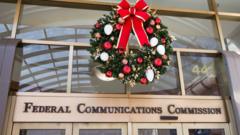In a critical decision, a U.S. court has turned down the Biden administration’s efforts to restore net neutrality regulations, declaring that the federal government lacks the authority to oversee internet service providers in the same way it does utilities. This ruling represents a significant defeat for supporters of an open internet who have campaigned for rights ensuring that internet providers like AT&T must treat all legal content equitably.
Court Dismisses Bid to Reinstate US Net Neutrality Rules

Court Dismisses Bid to Reinstate US Net Neutrality Rules
The ruling signals a major setback for advocates of open internet as regulatory battles continue.
Originally instituted by the Federal Communications Commission (FCC) under former President Barack Obama, these rules were dismantled during Donald Trump’s presidency, leaving the issue in limbo as Trump readies for another term. The implications of the court’s decision are profound, indicating a probable end to a prolonged legal struggle surrounding net neutrality.
The judges emphasized that differing interpretations among administrations contribute to the ongoing confusion. They cited a recent Supreme Court ruling which limits federal agencies' powers to reinterpret laws, clarifying that the court no longer needed to accommodate the FCC's interpretations. This ruling, articulated by the Sixth Circuit Court of Appeals, particularly relates to a case known as Loper Bright, and has the potential to curb the FCC's regulatory flexibility significantly.
Brendan Carr, a Republican commissioner at the FCC whom Trump has appointed to lead the agency, supported the court’s ruling, labeling it an end to what he referred to as the Biden administration’s "Internet power grab." Conversely, outgoing FCC Democratic Commissioner Jessica Rosenworcel argued that the ruling shifts the responsibility to Congress, stating that "consumers across the country have told us again and again that they want an internet that is fast, open, and fair."
With the fierce debate over net neutrality having lost momentum since the rules were overturned in 2018, Thursday’s ruling does not impede state laws that maintain similar protections. However, advocates for net neutrality, including public figures such as comedian John Oliver, argue that national regulations are crucial to prevent internet service providers from throttling content or imposing extra charges for faster service.
Public Knowledge, an internet policy-leading organization, criticized the ruling for undermining the FCC's ability to develop privacy protections and other essential safety measures. They contended that the court wrongfully classified internet service providers strictly as "information services" rather than as telecommunications companies, thereby creating a regulatory void that allows broadband providers excessive control over users’ internet access.
In contrast, USTelecom, which includes major industry players like AT&T and Verizon, heralded the ruling as a triumph for American consumers, claiming it would stimulate investment, spur innovation, and boost competition within the evolving digital marketplace.
The judges emphasized that differing interpretations among administrations contribute to the ongoing confusion. They cited a recent Supreme Court ruling which limits federal agencies' powers to reinterpret laws, clarifying that the court no longer needed to accommodate the FCC's interpretations. This ruling, articulated by the Sixth Circuit Court of Appeals, particularly relates to a case known as Loper Bright, and has the potential to curb the FCC's regulatory flexibility significantly.
Brendan Carr, a Republican commissioner at the FCC whom Trump has appointed to lead the agency, supported the court’s ruling, labeling it an end to what he referred to as the Biden administration’s "Internet power grab." Conversely, outgoing FCC Democratic Commissioner Jessica Rosenworcel argued that the ruling shifts the responsibility to Congress, stating that "consumers across the country have told us again and again that they want an internet that is fast, open, and fair."
With the fierce debate over net neutrality having lost momentum since the rules were overturned in 2018, Thursday’s ruling does not impede state laws that maintain similar protections. However, advocates for net neutrality, including public figures such as comedian John Oliver, argue that national regulations are crucial to prevent internet service providers from throttling content or imposing extra charges for faster service.
Public Knowledge, an internet policy-leading organization, criticized the ruling for undermining the FCC's ability to develop privacy protections and other essential safety measures. They contended that the court wrongfully classified internet service providers strictly as "information services" rather than as telecommunications companies, thereby creating a regulatory void that allows broadband providers excessive control over users’ internet access.
In contrast, USTelecom, which includes major industry players like AT&T and Verizon, heralded the ruling as a triumph for American consumers, claiming it would stimulate investment, spur innovation, and boost competition within the evolving digital marketplace.





















